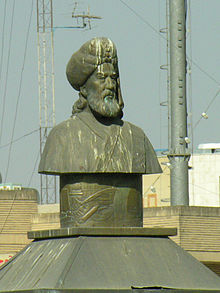Burzoe

Burzoe or Borzuye ( Bozorgmehr , also Borzoyeh or Borsuye ; Persian برزویه) was a Persian physician and statesman of Sassanid Iran in the 6th century. Burzoe was Chancellor and personal physician to the Persian Shah Chosrau I (Anuschiravan) and a scholar at the Academy of Gundischapur . He translated the Indian Panchatantra from Sanskrit into the Middle Persian language Pahlavi. The book later became known as Kalīla wa Dimna . The work contains fables and stories in which animals play the main role.
As Chosrau's personal physician, according to the poet Firdausi , he is said to have interpreted a dream of the ruler of a rising sun in Arabia as a prediction of the appearance of the Prophet Mohammed and the suppression of the teachings of Zoroaster, whereupon Chosrau (also called Anuschirawan) was deeply shaken and died shortly afterwards should be.
The book Pandnamak-i Vozurg-Mihr-i Buchtakan is also ascribed to Burzoe. This has also been translated into various modern languages.
Burzoe had found out the rules of the chess game brought to Chosrau's court from Hindustan . The invention of the game backgammon in its old version ( Nard ) is attributed to Burzoe.
His introduction to Kalīla wa Dimna shows that Burzoe would adopt a religious skepticism if Ibn Al-Moqaffa, his translator into Arabic, did not ascribe the words to him.
Source collection
- Geo Widengren (Ed.): Iranian Spiritual World. Holle, Baden-Baden 1961, pp. 94-108 (with Burzōēs introduction to the book Kalila wa dimna).
Web links
Individual evidence
- ^ Peter Lamborn Wilson , Karl Schlamminger: Weaver of Tales. Persian Picture Rugs / Persian tapestries. Linked myths. Callwey, Munich 1980, ISBN 3-7667-0532-6 , pp. 79-139 ( The Kings ), here: pp. 87 f. ( Anuschirawan ).
| personal data | |
|---|---|
| SURNAME | Burzoe |
| ALTERNATIVE NAMES | Bozorgmehr; Borzoyeh |
| BRIEF DESCRIPTION | Persian physician and personal physician to Chosrau I and scholar at the Academy of Gundischapur |
| DATE OF BIRTH | 5th century or 6th century |
| DATE OF DEATH | 6th century or 7th century |